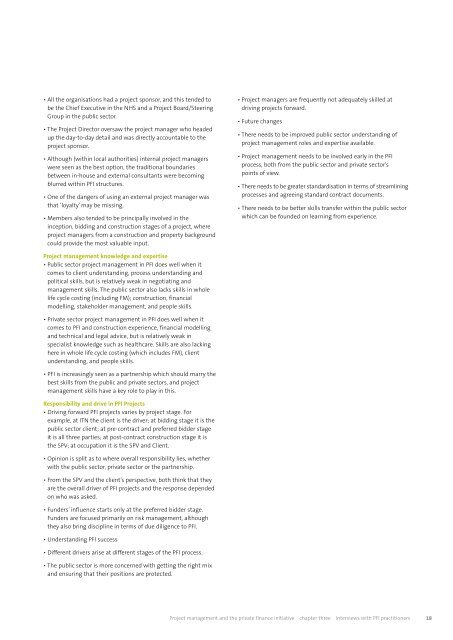Project management and the private finance initiative
Project management and the private finance initiative
Project management and the private finance initiative
Create successful ePaper yourself
Turn your PDF publications into a flip-book with our unique Google optimized e-Paper software.
• All <strong>the</strong> organisations had a project sponsor, <strong>and</strong> this tended to<br />
be <strong>the</strong> Chief Executive in <strong>the</strong> NHS <strong>and</strong> a <strong>Project</strong> Board/Steering<br />
Group in <strong>the</strong> public sector.<br />
• The <strong>Project</strong> Director oversaw <strong>the</strong> project manager who headed<br />
up <strong>the</strong> day-to-day detail <strong>and</strong> was directly accountable to <strong>the</strong><br />
project sponsor.<br />
• Although (within local authorities) internal project managers<br />
were seen as <strong>the</strong> best option, <strong>the</strong> traditional boundaries<br />
between in-house <strong>and</strong> external consultants were becoming<br />
blurred within PFI structures.<br />
• One of <strong>the</strong> dangers of using an external project manager was<br />
that ‘loyalty’ may be missing.<br />
• Members also tended to be principally involved in <strong>the</strong><br />
inception, bidding <strong>and</strong> construction stages of a project, where<br />
project managers from a construction <strong>and</strong> property background<br />
could provide <strong>the</strong> most valuable input.<br />
<strong>Project</strong> <strong>management</strong> knowledge <strong>and</strong> expertise<br />
• Public sector project <strong>management</strong> in PFI does well when it<br />
comes to client underst<strong>and</strong>ing, process underst<strong>and</strong>ing <strong>and</strong><br />
political skills, but is relatively weak in negotiating <strong>and</strong><br />
<strong>management</strong> skills. The public sector also lacks skills in whole<br />
life cycle costing (including FM); construction, financial<br />
modelling, stakeholder <strong>management</strong>, <strong>and</strong> people skills.<br />
• Private sector project <strong>management</strong> in PFI does well when it<br />
comes to PFI <strong>and</strong> construction experience, financial modelling<br />
<strong>and</strong> technical <strong>and</strong> legal advice, but is relatively weak in<br />
specialist knowledge such as healthcare. Skills are also lacking<br />
here in whole life cycle costing (which includes FM), client<br />
underst<strong>and</strong>ing, <strong>and</strong> people skills.<br />
• PFI is increasingly seen as a partnership which should marry <strong>the</strong><br />
best skills from <strong>the</strong> public <strong>and</strong> <strong>private</strong> sectors, <strong>and</strong> project<br />
<strong>management</strong> skills have a key role to play in this.<br />
Responsibility <strong>and</strong> drive in PFI <strong>Project</strong>s<br />
• Driving forward PFI projects varies by project stage. For<br />
example, at ITN <strong>the</strong> client is <strong>the</strong> driver; at bidding stage it is <strong>the</strong><br />
public sector client; at pre-contract <strong>and</strong> preferred bidder stage<br />
it is all three parties; at post-contract construction stage it is<br />
<strong>the</strong> SPV; at occupation it is <strong>the</strong> SPV <strong>and</strong> Client.<br />
• Opinion is split as to where overall responsibility lies, whe<strong>the</strong>r<br />
with <strong>the</strong> public sector, <strong>private</strong> sector or <strong>the</strong> partnership.<br />
• From <strong>the</strong> SPV <strong>and</strong> <strong>the</strong> client’s perspective, both think that <strong>the</strong>y<br />
are <strong>the</strong> overall driver of PFI projects <strong>and</strong> <strong>the</strong> response depended<br />
on who was asked.<br />
• Funders’ influence starts only at <strong>the</strong> preferred bidder stage.<br />
Funders are focused primarily on risk <strong>management</strong>, although<br />
<strong>the</strong>y also bring discipline in terms of due diligence to PFI.<br />
• Underst<strong>and</strong>ing PFI success<br />
• Different drivers arise at different stages of <strong>the</strong> PFI process.<br />
• The public sector is more concerned with getting <strong>the</strong> right mix<br />
<strong>and</strong> ensuring that <strong>the</strong>ir positions are protected.<br />
• <strong>Project</strong> managers are frequently not adequately skilled at<br />
driving projects forward.<br />
• Future changes<br />
• There needs to be improved public sector underst<strong>and</strong>ing of<br />
project <strong>management</strong> roles <strong>and</strong> expertise available.<br />
• <strong>Project</strong> <strong>management</strong> needs to be involved early in <strong>the</strong> PFI<br />
process, both from <strong>the</strong> public sector <strong>and</strong> <strong>private</strong> sector’s<br />
points of view.<br />
• There needs to be greater st<strong>and</strong>ardisation in terms of streamlining<br />
processes <strong>and</strong> agreeing st<strong>and</strong>ard contract documents.<br />
• There needs to be better skills transfer within <strong>the</strong> public sector<br />
which can be founded on learning from experience.<br />
<strong>Project</strong> <strong>management</strong> <strong>and</strong> <strong>the</strong> <strong>private</strong> <strong>finance</strong> <strong>initiative</strong> chapter three Interviews with PFI practitioners<br />
18

















